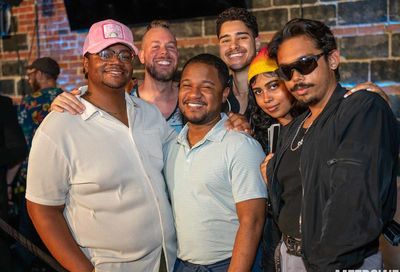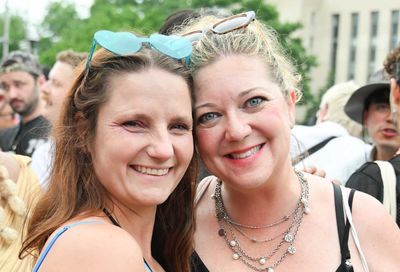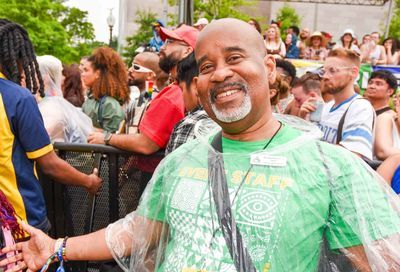Get Real
Chris Beckman Finds Himself Out in the Real World

This is the semi-true story of seven models picked to live in a mansion and have their lives improved through editing to find out what happens when people stop being polite and start getting famous.
Ahh, The Real World. When Bunim/Murray Productions floated the idea for the reality program in the early 1990s, critics predicted a flop. Who wants to watch Gen X’ers eat cereal, shoe shop and embark on the myriad other tasks that make real life real life? Well, 68 million, by the latest count. The Real World was the seminal brick in the wall of reality TV that now maroons people on islands, gets millionaires laid and covers David Hasslehoff in worms.
When planning the first season, the creators fretted over whether a gay character would alienate their youthful audience. That was ten years ago. Since then, they’ve had courtships, breakups, and countless decibels of whining. But through it all, the gay characters (most often a strong-willed lesbian or a hunky, artsy gay male) have proved consistently popular, so much so that the latest season contains two: Aneesa, a lesbian from Philly, and Beckman, an artist from “The City of Champions,” Brockton, Massachusetts, home of Rocky Marciano.
When filming began, Beckman, now 25, was beginning a long battle with substance abuse. This struggle, along with the fact that he’s gay and happens to be gorgeous, made him one of the season’s most interesting cast members. Now that Real World Chicago is over (the season finale aired on Tuesday), he lives in New York. He continues to be a successful artist, is aspiring to be a model, is still gorgeous, and is still sober.
Bashing The Real World is easy and popular. Yeah, it’s not as real as it claims to be, and yes, it drove music videos out of MTV more efficiently than Cribs and Beavis and Butthead combined. But it consistently has been one of the trailblazers in bringing gay characters to mainstream television. And no matter how much you love to hate it, you’d be on there in a second if they’d cast you.
MW: You really couldn’t pick a more perfect setting for the classic Traumatic Gay Childhood than Brockton, Massachusetts, what with the boxing machismo and all.
CHRIS BECKMAN: Yeah, Brockton was definitely not liberal. I learned at an early age how not to be gay. For me, coming out meant moving to the city and finding the gay neighborhood of [Boston’s] South End when I was seventeen. I went to Suffolk University on a program I was uncomfortable with — psychology, then law. I was doing it for my family. So I transferred out to UMass Boston where I took some studio art courses and realized that my underlying desire was to express myself through art.
MW: Why do you think it took you so long to realize this?
BECKMAN: In high school I wanted to fit into a certain group. I didn’t want to be one of those “types.” The same went for acting. I always wanted to act in high school, and now The Real World has allowed me to express that part of myself.
MW: So you’re pretty all around artsy. Why do you think such a disproportionate number of creative people are gay?
BECKMAN: I think that as gay people, we’re less likely to lose that creative side of ourselves because we aren’t as expected to conform. We’re a subculture, evolving and trying to find our own bohemia.
MW: Were you creating art throughout your struggle with substance abuse?
BECKMAN: Yeah. When I look back at the art I was making then, it was really dark stuff. I wasn’t painting, just drawing demon-like figures. A lot of my drawings were of the party scene. They’re about where I was in my life at that point and how I saw myself. It was a really dark time.
|
MW: When did you start realizing you had a problem?
BECKMAN: It was through a series of drunk episodes. Drama, fights. I wasn’t responsible. I was so caught up in the party scene that I couldn’t do the things that made me feel fulfilled. I visited D.C. during that time, but I only vaguely remember it because I was so twisted. My friends couldn’t count on me. I realized I had to get back to being a man of my word, so I checked into rehab, a detox in Boston, and basically just got off substances. In a way, I think coming out as an addict was more difficult than coming out as gay, because gay I understood. I didn’t know why I was an addict. I got all these questions about addiction from my roommates on the show, and I didn’t have the answers. I just know that as I got sober, it felt better. I look back at those early episodes as a period of growth.
MW: Do you still consider yourself to be in recovery?
BECKMAN: I’m not fully recovered. I’m not sure I ever will be. Some days are really difficult. I don’t want to get out of bed, I don’t want to go to the meetings. But I look back at the show from last July and I see myself and how much I’ve changed.
MW: Changed how?
BECKMAN: I’ve learned how to feel actual feelings. I’ve learned who I am and how to accept my faults. Feeling anything for myself back then was so difficult, I ran from the pain and from believing I wouldn’t be accepted.
MW: Why do you think the gay scene is so centered around drugs and alcohol?
BECKMAN: That’s just our social circuit. Bars are where gay men can go to meet other gay men. For me, that’s how it all started. Everyone else was doing substances so it made me comfortable doing them, too.
MW: So are you uncomfortable now that don’t? Do you feel like you’re somewhat excluded from the scene since you got sober?
BECKMAN: No, I still go out. It’s just that my life has changed so that going out isn’t all-important to me anymore. My life had become so superficial. It was all about where I was going and what I was going to wear. When I first got sober, I was bitter and resentful that everyone else could drink and I couldn’t. My sober friends would tell me I shouldn’t be going to those environments. But I test the waters. That’s just my personality.
MW: When choosing people to be on The Real World, it’s pretty clear that MTV goes for a broad cross-section of “types.” Do you think that you might not have been picked if you were straight?
BECKMAN: It’s possible. I was actually the last person picked, and they had already picked a lesbian, so I don’t know.
MW: Auditioning for a reality show is one of those rare instances where being gay actually works to your advantage, I suppose.
BECKMAN: Yeah, gay is in. Everyone’s doing it. Actually, I’m not even gay. I just pretend to be so I can get chicks.
MW: Okay, we’re on the record here Chris.
BECKMAN: [Laughs.] Oh, right. Edit that out.
MW: Sure thing. So you say the show gave you a chance to explore your inner-actor. Did you modify your behavior at all because you knew that you had an audience?
BECKMAN: Not really. After two months I was completely just living my life. I guess the only real modification I made was to my love life. I don’t know how the others on the show dated. I couldn’t do it with all the cameras there. How can you open up to someone like that? When I met Kurt [in episode two], he didn’t know I was on the show. He had just done the AIDS Ride from Minneapolis to Chicago and was in town for the night. He ended up staying longer and we went out to dinner. Picture a really nice Italian restaurant, a candlelit dining room. It’s elegant, it’s dark. A cameraman pulls a chair up to your table, stands up on the chair and begins filming you from above. That’s the part the television audience doesn’t see, and it’s so weird. Four or five people always hovering around you.
MW: But you and Kurt still managed to make it work for awhile.
BECKMAN: Well, Kurt and I actually only went out on probably six dates, but the producers of the show made it seem like it was practically the whole season. I mean, how can you tell a story of four months’ time in a span of twelve hours? They’re into what sells. Drama, sex, fights. But they portrayed me accurately. I have no complaints.
MW: I remember a few years ago when Norm, one of the cast members from The Real World’s first season, said in an interview that parts of the show were scripted. Care to comment?
BECKMAN: We weren’t encouraged to act any certain way at all. The only thing they tried to create was the presence of all seven of us being together. It was really important that all seven of us be together to do stuff. The most difficult thing for me was not being able to come and go as I pleased. You couldn’t leave the house without checking if it was okay first. You’d have to call the director to get his approval and then wait for the camera crew to get ready to follow you. There were certain restaurants we couldn’t go to and museums they couldn’t film at. But I certainly got to the art museums.
MW: Did you consider the museums to be a place where you could escape for awhile?
BECKMAN: Yeah, all of us dealt with the pressure in different ways. Some of us slept, some went to the movies. I went to museums and the gym.
MW: How much were you interacting with the show’s producers and camera crews?
BECKMAN: Not really at all. A wall was created. We weren’t allowed to talk to [the camera crews] and they weren’t allowed to talk to us. They couldn’t show emotion or laugh at what we were talking about. But we always knew they were there.
MW: Did you ever get sick of having a lens in your face?
BECKMAN: After September 11, I didn’t want to be part of the show anymore. It’s not that I stopped being involved, it’s just that after such a drastic and devastating event, the last thing I wanted was to be part of some bullshit reality TV show. I felt isolated from the world, not having my family close. What were we doing on September 11? We were taking press photos for MTV. I mean, just that alone made me feel so helpless and isolated. I didn’t want to be stuck in a TV set.
MW: Photo shoots, phone calls to the director — it sounds like a very celebrity type of lifestyle for such a Real World. Do you feel like a celebrity?
BECKMAN: Only in the sense that people know me by face and know about my life. Actors and actresses can hide behind the role that they’re playing, but I think people who have seen me on the show feel comfortable coming up to me.
MW: Do you like being recognized?
BECKMAN: Sometimes. My fear was that people who came up to me on the street would just see me as the gay guy from The Real World. But people just see me as Chris. Kids in the city come up to me and are like, “Yo man, what’s up?” It shows there’s a change going on, and it’ll continue to grow as long as we remain visible.
MW: A lot of fairly young kids watch The Real World. Do you think that as a gay character, you have an impact on their worldviews that will stick with them as they get older?
BECKMAN: I think so. I get approached by straight kids who are fourteen, fifteen years old. It’s that time of early adolescence that kids absorb all these stereotypes and prejudices.
MW: You’ve experienced the effect of the media on the gay movement from both sides now. How important to the movement do you believe media presence is?
BECKMAN: It’s so powerful. It’s a pathway that we’re creating, and our presence there will lead to change and education. I never fully understood the power of TV until I was a part of it.
Chris Beckman will appear at VelvetNation, South Capitol and K Streets SE, on Saturday, July 13. Entry is $8 from 10 to 11pm, $12 thereafter.
Support Metro Weekly’s Journalism
These are challenging times for news organizations. And yet it’s crucial we stay active and provide vital resources and information to both our local readers and the world. So won’t you please take a moment and consider supporting Metro Weekly with a membership? For as little as $5 a month, you can help ensure Metro Weekly magazine and MetroWeekly.com remain free, viable resources as we provide the best, most diverse, culturally-resonant LGBTQ coverage in both the D.C. region and around the world. Memberships come with exclusive perks and discounts, your own personal digital delivery of each week’s magazine (and an archive), access to our Member's Lounge when it launches this fall, and exclusive members-only items like Metro Weekly Membership Mugs and Tote Bags! Check out all our membership levels here and please join us today!





















